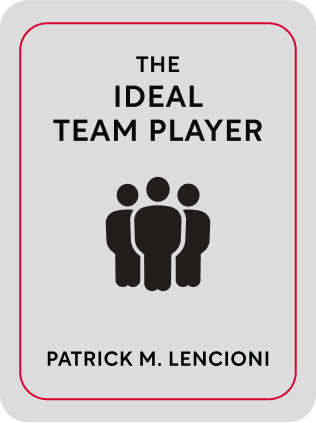

This article is an excerpt from the Shortform book guide to "The Ideal Team Player" by Patrick M. Lencioni. Shortform has the world's best summaries and analyses of books you should be reading.
Like this article? Sign up for a free trial here .
Are your employees natural team players—humble, hungry, and smart? What can you do to instill these qualities in your workforce?
For organizations committed to a teamwork culture, the right people are ideal team players who are humble, hungry, and smart. People who are humble focus on the success of the team rather than their personal interests. People who are hungry are driven to seek more work and responsibility. And people who are smart have common sense when it comes to dealing with people—they understand where others are coming from.
To help those who are significantly lacking in one of the virtues, here are some approaches.
1. Developing Humility
Talking to an employee about a lack of humility can be uncomfortable because it stems from insecurity (insecure people either overstate or understate their abilities) and is deeply personal. If a manager talks about her own challenges with humility—everyone is insecure at some level—it may help the employee feel more comfortable discussing the problem.
Also, if you can help the employee identify the reason they lack humility without trying to be a psychologist, it may be easier for them to improve. Sometimes, lack of humility can be a result of personality type (assessments like Myers-Briggs may be helpful). Knowing that others with their personality type have the same issue can be a relief and a motivation to improve.
Some employees can improve if they simply start acting differently, practicing the behaviors they need to develop. For instance, they can push themselves to compliment someone, show interest in others, or admit a mistake. One method is for employees to make a list of desired behaviors and track how often they practice them. When employees see the benefits of humility for themselves and others, they’ll be motivated to continue and it will become automatic.
Having teammates encourage the employee by highlighting the positive behaviors can help reinforce them as well—for instance, a coworker might say, “I appreciated your compliment the other day …”
2. Developing Hunger
Out of the three team-player virtues—humble, hungry, and smart—hunger is harder to develop because it involves attitude. Lack of motivation is obvious and measurable—people who lack hunger typically do less or produce less. But pointing out the need to do more isn’t enough.
People who are unmotivated often choose to be this way because it’s to their benefit—not being the one who offers to do more means less pressure and responsibility and more time to do what they prefer doing. Some people prefer a predictable routine at work, so they can focus their energy on outside interests.
People who don’t want to change need to find jobs where hunger isn’t important; managers can only help those who want to be more successful in a teamwork culture. Here are some additional steps managers can take:
Create Passion for the Mission
To be hungry, people need to understand the importance of the work they’re doing. Managers can help build motivation by connecting the work with its impact on others—for instance, on customers, vendors, or other employees. Show employees that their work matters to people.
Also, team members can help spread their passion to less-motivated coworkers by sharing their sense of mission. Non-hungry employees may get on board, or at least feel more motivated to help coworkers.
Set Specific Goals and Expectations
Another way to motivate an employee is to set specific goals and hold her accountable for meeting them. Everyone, but especially unmotivated people, should have performance goals.
But beyond telling someone to meet certain production goals, managers should set behavioral expectations. Tell unmotivated employees that they also need to help colleagues or the team meet their goals. This may include taking on additional responsibilities or working more hours. With specific goals, employees will either step up or find another job.
Don’t Let Up
It takes time to break old habits. Helping people succeed requires “tough love,” or calling out unmotivated employees for behavior that needs to change. This should be done tactfully, constructively, and regularly.
Waiting until a performance review is too late—reviews criticize behavior that occurred in the past, which the employee wasn’t given a chance to correct. Employees need immediate, explicit feedback so they can act. And they need to hear it repeatedly until their behavior changes.
Recognize Progress
When an unmotivated employee shows hunger, managers and teammates should praise and encourage him. In time, extra encouragement won’t be needed, but it can make a difference in the early stages.
3. Developing People Skills
Helping someone become smarter about dealing with people isn’t as sensitive as developing the other qualities, but it still can be challenging. It’s easier if managers and teammates remember that those who lack interpersonal skills aren’t usually intentionally being difficult or trying to cause problems. They just don’t pick up on how their words and actions affect others. But with help, they can change.
When they do the wrong thing, immediately call attention to it as you would with a puppy in training. For example, you might say, “Your email really upset your coworkers but I know you didn’t mean to sound so harsh. Before you send an email next time, you might want to have someone look over it and help you reword it.”
People who are really interested in improving appreciate such feedback.
Coaching Team Players
People who are already ideal team players may still want to improve because they’re hungry.
The best way to help is to enlist other strong team players as coaches.
For instance, a team player with outstanding people skills could coach a teammate who wants to improve in that area. Likewise, another teammate could coach the person with people skills on humility. When team players are coaching each other, both individuals and the team improve—the process strengthens everyone’s accountability and commitment.

———End of Preview———
Like what you just read? Read the rest of the world's best book summary and analysis of Patrick M. Lencioni's "The Ideal Team Player" at Shortform .
Here's what you'll find in our full The Ideal Team Player summary :
- The qualities of a model team player
- How to transform your organization by developing your current employees into team players
- How to make sure you hire team players in the future





